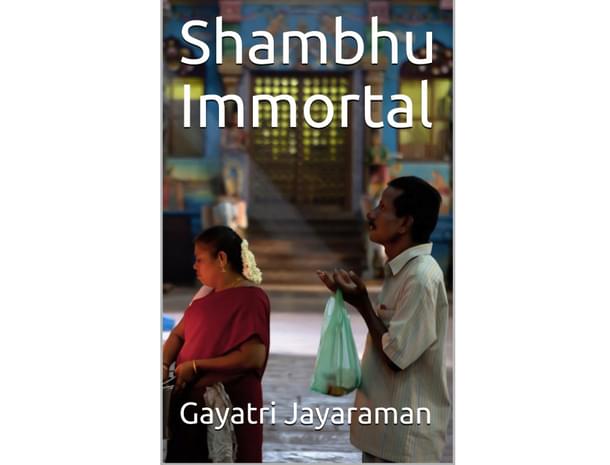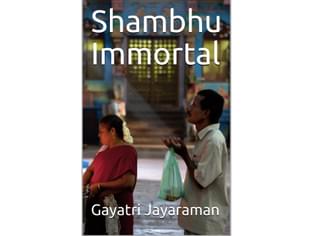Books
Shambhu Immortal: The Story Of A Boy Who Glows & A Syncretic Temple
Book Excerpts
Apr 03, 2017, 07:44 PM | Updated 07:44 PM IST
Save & read from anywhere!
Bookmark stories for easy access on any device or the Swarajya app.


Shambhu Immortal is the story of a boy who glows. He grows up in the shadows of the biggest, most revered temple in the land, the Temple Before Time, the Temple That Nobody Built. It has become so because it is also the Temple that has gone beyond the boundaries of caste, religion, community, sect, withstanding sieges both physical and moral by invaders and would be benefactors, internal and external politicking, it is the Temple that defines what a truly syncretic culture is.
Yet, in its shadows, much of what it stands for is forgotten. Shambhu, a foundling who carries an inner light, slips back and forth between his world and that of the Bridegroom that speaks to him, on the banks of the river Kaveri, the one consistent witness to the passage of time and history. With his companions Cauvery and Amrita, he explores the philosophies of advaita and visishta advaita, physics and metaphysics, caste and religion with the lens of a child. Trouble begins when the child Shambhu, wonderstruck by a local legend, begins to wonder if Lanka will truly sink into the sea if he scaled the rajagopuram?
I began writing the story eight years ago, long before the upheavals of religion in modern India began. I had grown up visiting my grandmother in the shadows of the Temple Before Time, the home of the Eternal Bridegroom, Shri Ranganathaswamy, and learning how it reached out beyond sects -- the Iyers in the shadow of Iyengar land, and the shrine to the Tulaka Naccaiyar, the legends and songs about the Dalit origins of its greatest saints, the poetry of Andal, the folklore and collective mythology of the believers. I grew up believing in the power of common devotees to change the trajectory and understanding of organised religion and saw Hinduism as a vibrant, collaborative force, open to assimilation and change. The Temple Before Time has been under siege many times, by time, by invaders, by overgrown forests, and wayward kings, and it has survived, saved not by one or the other of us, but by all of us, and by the sheer force of being Beyond all of us.
I wrote this book, the first of a three-part series to pay tribute, and remind myself and those of us who may read it, of that immense power. In global terms the book may fit into the magical realism genre, but India has no need for magical realism. We live it every day. Miracles, Gods, devotion, metaphysics and philosophy. That is the everyday of how we survive.
Reprinted below are excerpts from the first chapter of the book Shambhu Immortal. The book is available on Kindle here.
Jayaraman, Gayatri. Shambu Immortal. 215 pp.
STOLEN
“Oh, That is full.”
“Oh, This is full.”
“Oh, From the full cleave the full.”
“Oh, Diminish the full, still it is full.”
The chants, ringing out like a rest house with no rooms left to give patiently declining an insistent traveller, rose above the thwack of steel on skin. Temple towns were never designed to be battlefields. Winding stone and clay paths weave their way beneath coconut fronds and low-hanging mango branches, past lush paddy fields into which the human body falls with a moist thud; sliced and felled, a nose here, an arm there. Accompaniments to the orchestra of the beseeching brahmin.
“Whose blood is this, seeping into me?”
The river gurgled, the roots of the banyan curling their toes, the always-parched shrubbery drinking it in.
“Whose? Whose?”
In a maze-like circuit of interlocked hands they stood. Five hundred brahmins shoulder-to-shoulder with the shudra, against a common enemy the kshatriya had failed to keep from their threshold. It had come to this: the last ring of complicity. The former clutching learning the latter, leather and steel.
Nahin nahin rakshatih dukrijnkarane; neither’s lexicons stepping in to shield them.
They took their positions in the rings around the rings around the Temple Before Time. Flanking
The parakramas, on the roofs, ready to fling themselves down, their bodies the only tactical warfare they had thought to study, all the enemy their preceptors had taught them to fight against, vulnerable except in surrender.
In analogous rows, a battalion of danseuses. The accordion pleats of their parakeet dhotis and betel-stained mouths, chiming anklets, bejewelled waist bands catching the slant of sun. The ostentatious odour of champa and spiced hair oil striking a strange harmony with sandalwood paste and vibhuti. Sheathed in armours of betrothal, seduction their weapon, their bodies, as always, the final barrier.
No man a warrior before his time and all men heroic long after.
Three-days-and-three-generations long a siege, adequate for a hastily-constructed stone wall to be mounted around the sanctum and for the divine consort to be buried under a tree in the courtyard. Futility stays productive. It took barely two hours for the wall to be broken by the enemy’s battering rams and every square inch of courtyard to be ploughed again. Those who reaped the harvest planted those who had sown it within.
The river, its tributaries and streams, the puddles it leaves in its wake when it has retreated over flooded ground, its insidious seepage through mud walls and the damp that creeps into the bones of men, ache with no answer to the question:
“Whose blood is this, seeping into me?”
All are levelled in the service of the Bridegroom.
The ovoid emeralds of His eyes shone a mischievous bluish-green from the dark corner where he rode in the back of the bounty cart. He bounced around amongst horse-hilted silver swords with dried smears of recently-dripping blood, the raw silk angavastrams of the now-headless head priests, the polished-with-devotion brass and copper lamps, and the pearls and gold coins of the treasury of the Temple Before Time. Fourteen days through dense rainforest, across windy plateau and craggy ghat it took to reach the Sultanate of Delhi. They paused to survey the misalignment of the heavens in the star-shaped plinth that now made unmanifest the lingam at Door to the Ocean.
Soapstone resonates with voice long after the mouths are gone, and the stanzas of teachers who had consecrated it barely six full moons prior had reinforced nothing. Here stood guileless apsaras and their bodyguards frozen in terror, their noses sliced off, their wings defeathered. Plucked like the naiveté of dynasties that believed a worshipped beauty would inure them to savage war. The bodies of the men who artlessly defended them lay strewn at their feet, offerings no deity would deign to redeem. Human sacrifice was not a blessing the gods knew how to respond to. So they sat silent. Turned to stone.
The ravages of that seductive slave-turned-general, the un-purchasable lover of that demon of the new Sultanate, the red-haired lion Allauddin Khilji, bought for a thousand gold coins, the hazar-dinari, he-of-the-lustrous-hair and sweetheart-face and kohl-lined eyes and curved-hip Malik Kafur, white camphor, a quietly burning all-consuming lover.
Once Chand Ram, sold into labour in the bazaars of Khambat like the fishing nets he mended and that he now cast across lands emboldened by his castrated love. It is at once the ultimate triumph and test of character to be handed dominion over those you once served. From within Kafur surfaced a cruel plunderer. In return for his redeemer’s affections, nothing less than the complete destruction of everything that he once was would now suffice.
Kafur collected the rings off the fingers of each prince he slashed down on a silver cord tied around his waist. Conquest for conquest, it sought to match the silken zunnar that bound him to his master. It was from him that he learned to sense in which direction the fear coursed through in its deepest vein in a man, in a village, in a town. When he entered a territory, he took the highest point in the village and stood, silent amidst the chaos, watching. When he spotted it, he would make that his most unfailing weapon. The fears of men turned against them. His eyes sparkled with a sadistic razor gaze in constant quest of unflinchability. He left the fearful to his men. The unyielding, he went for himself.
At Door to the Ocean, Kafur tossed into the bounty wagon two solitaires plucked from the eye sockets of the thousand-sparkle-flecked consort, the woman in stone he could think of no use for. Her eyes were so brilliant, a veritable Mountain of Light, he kept one as reward for his undying loyalty, and named the other, a gift for his lover.
In deference to the Mountains of Light wrapped in a stolen rag of silk, buried in the back of a humble horse carriage, the sun dipped her effulgence across the lower subcontinent from Hoysala to Lanka, bathing the horizons in the ochre of a bloodied twilight that stretched for fourteen days. The birds were not told to cease their song after the first failed sunset, and confused and exhausted, crashed to the forest floors by morning. The Night Queen released her fragrance by day, the Ashokas spreadeagled themselves, and the choke weeds of the freshwater inlets grew thick stubby trunks defending themselves against what sustained them. The fish dived to depths where in the cool dark, seeking direction, they were gnawed on by nervous plankton. Even the mighty rivers of the South rolled backwards, weeping, to the hill towns of their origins.
The Light mined from the heart of the churned earth of Kollur, coagulant of a splintered race, rocked casually against the Bridegroom’s flinching bosom. Vaishnava and Saivite jolted together towards the rocky north, breast to breast, alongside 312 elephants, 20,000 horses, and 10 crore gold coins, a journey on which all union was made possible.





